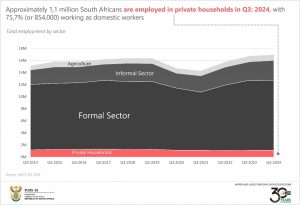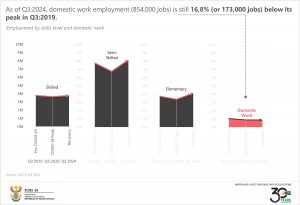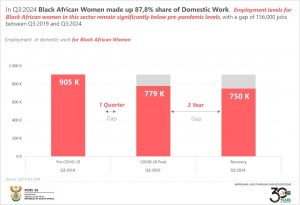Domestic Workers Face Slow Post-Pandemic Recovery
In South Africa, employment in private households represents a crucial segment of the labour market, making a significant contribution to total employment despite being relatively vulnerable and largely informal.
According to data from the Q3: 2024 Quarterly Labour Force Survey (QLFS), approximately 1,1 million South Africans are employed in private households, with 75,7% (or 854 000) working as domestic workers. These workers form an essential support system for families across the country.
Domestic work encompasses a variety of tasks, but its defining characteristic is that it takes place in or for a private household. This category includes live-in and live-out domestic workers, those working on a casual or hourly basis, and those employed through or by a service provider.1 They perform vital tasks such as childcare, cleaning, cooking, and elderly care, enabling other South Africans to work outside their homes. However, despite the essential nature of their work, domestic workers face ongoing vulnerabilities and economic uncertainties, which have only intensified in recent years.
Between Q3: 2014 and Q3: 2019, domestic work employment showed modest growth of 6,8% (or 65 000 jobs), increasing from 961 000 to 1 million jobs. This steady rise indicated a stable demand for domestic services. However, the onset of the COVID-19 pandemic in 2020 disrupted this trend. As the pandemic kept people home, demand for domestic work declined sharply by 15,9% (or 163 000 jobs), falling to 864 000 in Q3: 2020.
While employment in private households began to recover slightly with a 0,8% increase in Q3: 2021 as restrictions eased, the demand for domestic help continued to decline. By Q3: 2024, domestic work employment had decreased further to 854 000 jobs – still significantly below the pre-pandemic level of 1 million in Q3: 2019. This post-pandemic decline also reflects financial pressures on households, many of whom have reduced spending on non-essential services like domestic help due to rising inflation.
Struggles for Recovery: Domestic Work Lags Behind Other Occupations
Despite the broader economic recovery seen in many occupations, domestic work remains one of the hardest-hit sectors, struggling to regain its pre-2020 employment levels. As of Q3: 2024, domestic work employment (854 000 jobs) is still 16,8% (or 173 000 jobs) below its peak in Q3: 2019. This slow recovery underscores the unique economic pressures faced by private households. In contrast, elementary occupations – including farm labourers and construction and maintenance workers – have rebounded, with a 9,8% increase that surpasses pre-pandemic levels.
The International Labour Organization (ILO) has set a goal to achieve decent work for domestic workers by ensuring they receive the same labour and social protection as other workers. However, domestic work remains an undervalued and often unprotected occupation, with many domestic workers lacking essential social protection, including unemployment benefits. This lack of support leaves them particularly vulnerable during economic downturns.
In South Africa, domestic work is a vital yet fragile part of the economy, primarily employing black African women, who experienced the steepest employment decline among population groups during the COVID-19 pandemic. Employment levels for black African women in this sector remain significantly below pre-pandemic levels, with a persistent gap of 156 000 jobs between Q3: 2019 and Q3: 2024.
Domestic workers provide essential services to millions of households worldwide and play a crucial role in the care economy. The COVID-19 pandemic has highlighted both their indispensable contributions and their vulnerabilities. As South Africa’s economy recovers, the private household sector continues to lag, underscoring the need for a focused strategy to support a sustainable recovery for domestic workers.
[1] https://webapps.ilo.org/digitalguides/en-gb/story/domestic-workers#how-many
For more information download the full report here.




